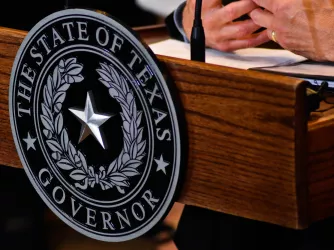Table of Contents
Confused Protesters Disrupt Dialogue Between Peter Thiel and UC Berkeley Students

Last night, entrepreneur and libertarian Peter Thiel was taking questions from students gathered to hear him speak at the University of California, Berkeley (UC Berkeley) when scores of protesters broke into the venue and shouted Thiel down, halting the event. The Berkeley Forum, the student organization that hosted the event, later criticized the protesters for depriving Thiel and audience members of the opportunity to “engage in productive discussion.”
The incident is yet another deplorable example of the all-too-common “heckler’s veto,” which occurs when people opposed to someone’s viewpoint or expression silence the would-be speaker by creating such a commotion that the speaker is forced to step down. Though critics have a right to add their voices to any debate, contributing to the “marketplace of ideas” that universities are meant to be, they may not supplant others’ expression with their own and interfere with the right of others to hear the speaker’s message. FIRE has made this point repeatedly, for example, in our reporting on Brown University students precluding former New York City Police Commissioner Ray Kelly from speaking by shouting so that he could not be heard.
The Berkeley Forum, which describes itself as “non-partisan organization that invites guest speakers who span a variety of viewpoints and perspectives,” wrote in its statement:
While we respect and sympathize with the protestor’s right to demonstrate, the right of free speech and discussion is a two-way street. The Berkeley Forum is founded on the principles of free discussion and intellectual exchange. Moments before the demonstrators stormed the auditorium, Peter Thiel was preparing to answer a question regarding his views on the value of political protest, after which the event was to open up to audience questions. Sadly, the opportunity to engage in productive discussion on the matter was lost. The Berkeley Forum remains committed to the right of free speech and challenging the viewpoints of both our speakers and audience members.
FIRE hopes that those involved in the protest heed this important reminder.
In a strange twist from the normal heckler’s veto scenario, though, it’s not clear that the protesters were even objecting to Thiel or his viewpoints in particular—they were expressing opposition to the National Security Agency and to police brutality. One Twitter user celebrating the shutdown explained the connection between Thiel and the protests thusly: “Thiel’s Palantir [Technologies, a computer software company] is funded by CIA. Spies on people so they can rape forcefeed you through your ass.” But as Brietbart noted, “Evidently the demonstrators were unaware of Thiel’s opposition to intrusive government and his strong support for Ron Paul, who ran for president twice on a platform of upholding civil liberties against the security policies of the federal government.”
Students protesting the expression of people who actually may agree with them? This feels so familiar. Oh, that’s because the same thing happened at the University of Iowa (UI) last week.
FIRE is disappointed that students have blocked important and productive conversations because of a mistaken impression that someone is advocating for their oppression. And to see such flagrant contempt for free speech from students at UC Berkeley, birthplace of the Free Speech Movement, is especially woeful.
Whether or not one’s objection to a speaker is based on an accurate perception of his views, this principle is paramount: The best answer to speech with which one disagrees is more speech—not censorship.
Recent Articles
FIRE’s award-winning Newsdesk covers the free speech news you need to stay informed.

Gov. Greg Abbott’s order ‘hardening state government’ against China is dangerously hard to parse

Right, left, and in-between: Can we bring our differences to the table?

From the UK to Germany to Singapore: Police are watching what you post
